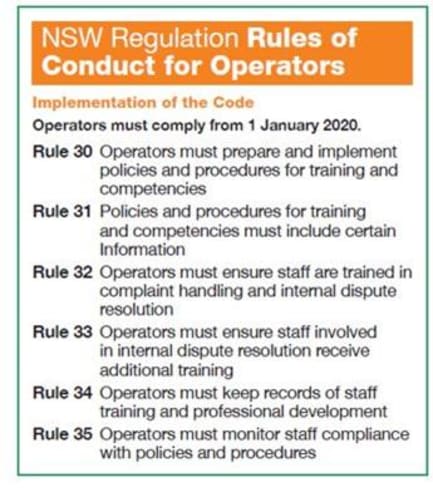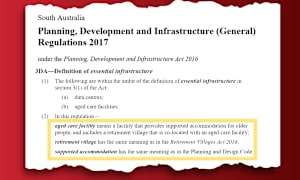Jim Gibbons, President of the (NSW) retirement Village Residents Association (RVRA) called out our editorial last week on who should be paying for village manager training – the operator or the residents.
We quoted past conversations we have had:
“The view of the Resident Associations is that in Year One it is the operator should incur the training cost because it is inferred in a village contract that the operator will provide a ‘professional’ manager.
In following years the operator can submit to residents to co-fund village manager training as it is an ongoing investment in skills.
Head office staff training is an operator cost.”
Jim has asked: “RVRA (NSW) would very much appreciate it if you would correct your statement about the views you imply to it”.
“I have to say that RVRA in NSW does not endorse the notion that residents should pay for the cost of complying with the Rules of Conduct”.
The Rules of Conduct for Operators are laid out in the Retirement Villages Amendment (Rules of Conduct for Operators) Regulation 2019 [NSW] which inserts into the Retirement Villages Regulation 2017 Schedule 3A. The objective of the Rules are stated in the following terms:
4 Objectives
The objectives of these rules of conduct are as follows:
(a) to establish the standards of conduct and behaviour that are expected of operators and their staff in relation to the management and operation of a retirement village, including a knowledge of relevant laws,
(b) to encourage higher standards of customer service to ensure that residents and prospective residents are treated with respect, dignity and fairness, and improving awareness of elder abuse,
(c) to promote fair, honest, transparent and ethical practices for the marketing and promotion of residential premises in retirement villages,
(d) to establish minimum standards for operators in the handling of complaints and the resolution of disputes in a retirement village,
(e) to set minimum training and competency standards for operators and their staff and ensure the effective oversight and supervision of staff”.
“The mind boggles at the suggestion that residents of villages should be required to pay extra for the achievement of these objectives! Do you imply that residents who refuse to pay for ongoing training will not receive the benefits of the Rules?”
“You may reflect on the state of affairs we have in this state when we have to legislate an obligation on village operators and their staff to induce behaviour which is respectful, dignified, fair, aware of elder abuse obligations, honest, transparent and ethical”.
Our comment: there is a direct correlation between the quality of village management and the value of the village as a business. Competent, well-trained village managers are vital for ‘happy residents’, who in turn promote the village and sales.
Financially, therefore the operator has the most benefit from village management training.
Our DCM Institute ongoing Village Management Professional Development program is $1850 per year for one manager, down to $1100 for 20 or more registrations. See below.
NSW Rules of Conduct, and Village + HO Manager Training in force in 7 weeks tomorrow
From January 1 all village operators in New South Wales are required to demonstrate compliance with the new NSW Rules of Conduct.
Check the ‘rules’ HERE.
The DCM Institute 2020 Professional Development program that delivers on the requirements of the NSW Rules of Conduct and the Retirement Living Council/LASA Code of Conduct.
A significant component of the regulation is that operators must have a clear, structured record of all training that is freely available and verifiable, for instance when an audit is conducted.
The training has to be identified against the individual currently employed. This means the record of training must travel with the individual.
Our DCM Institute web portal tracks are individual training modules completed and professional development points attained. Click HERE for more information.











